on the way用法
- 格式:doc
- 大小:21.50 KB
- 文档页数:1
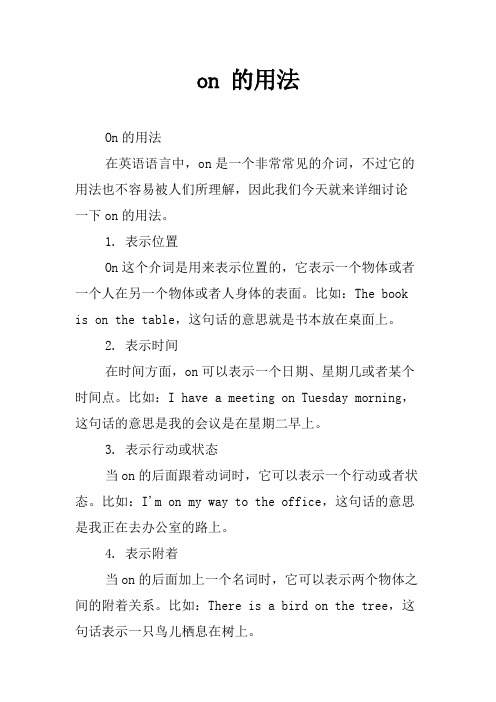
on 的用法On的用法在英语语言中,on是一个非常常见的介词,不过它的用法也不容易被人们所理解,因此我们今天就来详细讨论一下on的用法。
1. 表示位置On这个介词是用来表示位置的,它表示一个物体或者一个人在另一个物体或者人身体的表面。
比如:The book is on the table,这句话的意思就是书本放在桌面上。
2. 表示时间在时间方面,on可以表示一个日期、星期几或者某个时间点。
比如:I have a meeting on Tuesday morning,这句话的意思是我的会议是在星期二早上。
3. 表示行动或状态当on的后面跟着动词时,它可以表示一个行动或者状态。
比如:I'm on my way to the office,这句话的意思是我正在去办公室的路上。
4. 表示附着当on的后面加上一个名词时,它可以表示两个物体之间的附着关系。
比如:There is a bird on the tree,这句话表示一只鸟儿栖息在树上。
5. 表示联系当on用于表示两个概念之间的联系时,它可以表示两个概念之间的联系。
比如:I'm studying English on my own,这句话的意思是我正在自学英语。
6. 表示专门当on用于描述一个专门领域时,它可以表示特定的领域或者学科。
比如:I'm doing research on environmental science,这句话的意思是我正在研究环境科学。
7. 表示电子或数字当on用来表示电子或者数字时,它可以表示一个状态或者一些数据。
比如:I'm on the Internet,这句话的意思是我正在上网。
总结在英语语言中,on是一个非常常见的介词,它可以表示位置、时间、附着、行动或状态、联系、专门领域以及电子或数字等等。
在学习和运用英语语言时,我们需要理解它的不同用法,才能更加准确地表达我们所想表达的意思。
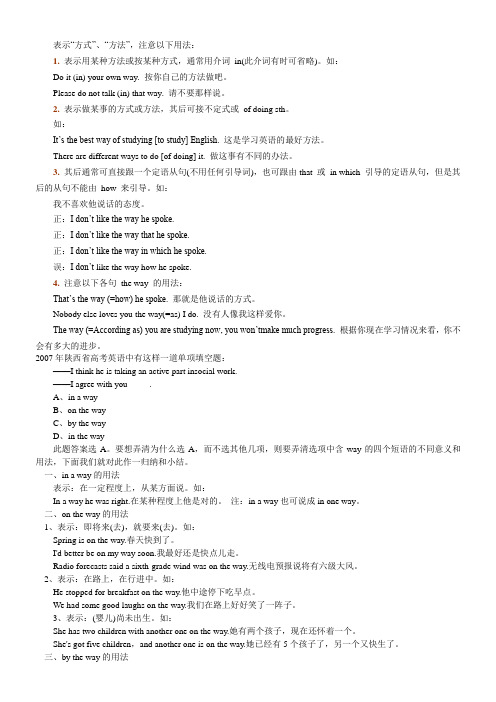
表示“方式”、“方法”,注意以下用法:1.表示用某种方法或按某种方式,通常用介词in(此介词有时可省略)。
如:Do it (in) your own way. 按你自己的方法做吧。
Please do not talk (in) that way. 请不要那样说。
2.表示做某事的方式或方法,其后可接不定式或of doing sth。
如:It’s the best way of studying [to study] English. 这是学习英语的最好方法。
There are different ways to do [of doing] it. 做这事有不同的办法。
3.其后通常可直接跟一个定语从句(不用任何引导词),也可跟由that 或in which 引导的定语从句,但是其后的从句不能由how 来引导。
如:我不喜欢他说话的态度。
正:I don’t like the way he spoke.正:I don’t like the way that he spoke.正:I don’t like the way in which he spoke.误:I don’t like the way how he spoke.4.注意以下各句the way 的用法:That’s the way (=how) he spoke. 那就是他说话的方式。
Nobody else loves you the way(=as) I do. 没有人像我这样爱你。
The way (=According as) you are studying now, you won’tmake much progress. 根据你现在学习情况来看,你不会有多大的进步。
2007年陕西省高考英语中有这样一道单项填空题:——I think he is taking an active part insocial work.——I agree with you_____.A、in a wayB、on the wayC、by the wayD、in the way此题答案选A。

中考介词用法总结一、几个常用介词用法归纳(一)in的用法:1. 表示地点、位置。
意思为“在……之中,在……里面”,例如:(1)They often spend holidays in the country. 他们经常在乡下渡假。
(2)The children are playing in the yard. 孩子们在院子里玩耍。
常见搭配:in the school 在学校里;in the way 挡路;in the library在图书馆;in the bookcase 在书架中;in the park在公园;in the chair 在椅子中(扶手椅);in a car = by car 乘车;in the middle of 在……中间;in church去教堂做礼拜;in front of 在……前面(外部);in the church在教堂;in the front of 在……前面(内部);in the hospital在医院;in the wall 在墙内(镶嵌);in hospital在住院;in the tree 在树上(不表生长)be ill in bed卧病在床;in one’s hand 在某人手中;in this way 以这种方式;in the sun 阳光下;in the rain 在雨中;in the wind 在风中;in the sky 在天空中;in one’s dream 在梦中;in the newspaper 在报纸上;in the book 在书上;in my eyes 在我看来;be in 在家;2. 表示时间的范围。
意为“在……时候”,如:(3)He gets up at six in the morning. 他早晨6点起床。
(4)The Second World War ended in 1945. 第二次世界大战在1945年结束。
常见搭配:in winter 在冬天;in the middle of May 五月中旬;in the end 最后;in the future 在将来;in the past 在过去;in the middle of the day 在中午;in/over the last/past ten years在过去的十年中;3. 表示时间的经过。

介词的用法与练习I.介词的种类1.?简单介词,常用的有at,?in,?on,?about,?across,?before,?beside,?for?,?to,?without,to,by,with,of,over,behind,up,after,against等。
2.?复合介词,如onto,?along?with,?because?of,?in?front?of,?instead?of等。
3.介词和其他词类的习惯搭配关系(1) 和动词的搭配,如agree with, ask for, belong to, keep away from, care about等。
(2) 和形容词的搭配,如afraid of, angry with, different from, good at(3) 和名词的搭配,如answer to , key to, reason for, avisit to等.***介词后常跟人称代词的宾格和动词的ing形式。
,,in this way 用这样的方法,inthatway,inotherway,intheseways6.across,through,和past“通过,经过”across从表面经过,如,road,bridge,riverthrough从内部空间经过,如:city,woods,forests,window,gatepast,从旁边经过.EX:Fillintheblankswith past,across or through.1.Wehavetowalk____________thegatetogointothefactory.2.Whenwewent__________thecinema,wesawatrafficaccident.3.Lookout___________thewindow,please.4.Don’twalk__________theice.It’sdangerous.5.Suddenly,ayoungmanran__________me.6.Ifyouwalk_________thesquare,youwillseetheSunflowerHotel.7.Therivergoes______________thecity.8.Theoldmancanswim__________thestream.9.Iwalked_________himwithoutsayinghello.10.Thearmymoved_____________theforestsquietly.7.for,since,A.since仅说明什么时候开始,,后常跟一个具体的过去的时间.B.for表示某动作或情况持续多久,后常跟一段时间。
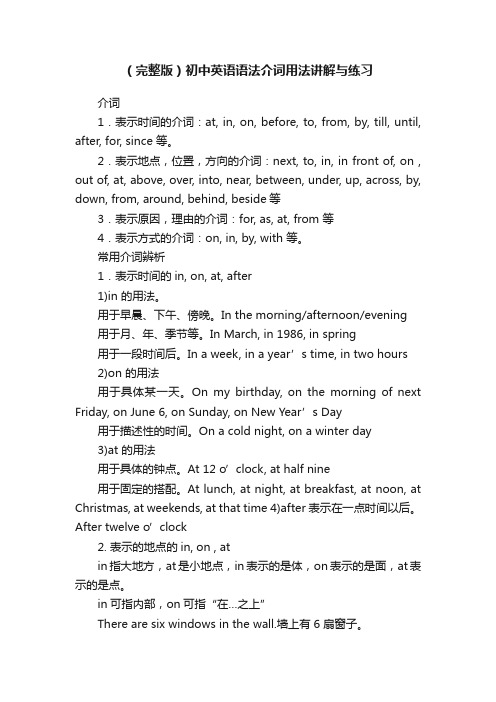
(完整版)初中英语语法介词用法讲解与练习介词1.表示时间的介词:at, in, on, before, to, from, by, till, until, after, for, since 等。
2.表示地点,位置,方向的介词:next, to, in, in front of, on , out of, at, above, over, into, near, between, under, up, across, by, down, from, around, behind, beside等3.表示原因,理由的介词:for, as, at, from 等4.表示方式的介词:on, in, by, with 等。
常用介词辨析1.表示时间的in, on, at, after1)in 的用法。
用于早晨、下午、傍晚。
In the morning/afternoon/evening用于月、年、季节等。
In March, in 1986, in spring用于一段时间后。
In a week, in a year’s time, in two hours2)on 的用法用于具体某一天。
On my birthday, on the morning of next Friday, on June 6, on Sunday, on New Year’s Day用于描述性的时间。
On a cold night, on a winter day3)at 的用法用于具体的钟点。
At 12 o’clock, at half nine用于固定的搭配。
At lunch, at night, at breakfast, at noon, at Christmas, at weekends, at that time 4)after 表示在一点时间以后。
After twelve o’clock2. 表示的地点的in, on , atin指大地方,at是小地点,in表示的是体,on表示的是面,at表示的是点。

at, by, to, in, for, of, on, from, with其中又以at, by, in, on为四大“要犯”!学习介词就是要抓住这几“要犯”。
有人写了一首《介词口诀》来帮助学习者;也有人写了《Preposition Song》令学习者一面唱歌一面轻松地记忆介词的用法。
同学们可以借助这个方法有针对性地记忆常用介词:1. In the summer at the seaside (季节用in, 在海边用at)On the coast we like it fine (在海岸用on)but in winter ,yes ,at Christmas (在圣诞用at)By the fireside we recline (放置) (在炉边用by)2. In July we went to Kenya (月份用in)Stayed in Lamu by the sea, (住在Lamu用in)We came back to TanzaniaThen across Victoria sea3. Did you come here in a taxi? (乘出租汽车用in)Or by bus, or on the train? (乘公共汽车用by, 乘火车用on) Did you come on foot this evening (步行用on)Or perhaps by aeroplane? (乘飞机用by)4. Will you come to tea on Monday? (在星期一用on)I′ll be home at half past three(时间三点半用at)Yes, I′ll stay for half an hour(长达半小时用for)if you buy some beer for me (给我for me)5. In the morning I drink coffee (早晨用in the morning)In the afternoon there′s tea(下午用in the afternoon)In the evening I have cocoa (傍晚用in the evening)Yes, at night ,it′s good for me.(晚上用at night)6. Where′s my pencil?In the kitchen (厨房里in the kitchen) On the table near the chair (在桌上on the table, 在椅边near the chair)Underneath the cup and saucer (在杯和碟的下面 underneath...) Just behind the teapot there (在茶壶后边behind...)7. Can you tell me how to get toMr. Johnson′s coffee-bar?Down the street and round the corner (down the street 沿着街道,round...绕过)Past the church and there you are8. Where′s the bookshop? Over there,dear (over there 那里) First turn left,then go straight on,Along the road,across the market (沿着路along the road, 穿过市场 across...)It′s in front of you, dear John(在你前面 in front of you) 9. There is nothing on the radio (广播on the radio) "Songs with orchestra" they said. (with后orchestra为有形物,无形物则用by)I′m not interested in music(interested in 兴趣于)so I think I′ll go to bed10. In a moment I′ll be finished(in a moment 片刻里) With these prepositions-so I will say to you in English till the next time, cheerio (加油呀) (till... 直到)记住这十段歌词后,你就学到许多介词用法了。

way用法及搭配一、way的基本用法1. 作名词- “way”可表示“道路;路线;方法;方式”等。
例如:- There's a long way to go before we reach the destination.(在我们到达目的地之前还有很长的路要走。
)这里的“way”表示道路,有一种路途遥远的感觉,可能会让人有些疲惫或者充满期待。
- I found a new way to solve this math problem.(我找到了一种解决这个数学问题的新方法。
)这个句子中“way”是方法的意思,当找到新方法时,会有一种成就感,就像在黑暗中找到了一盏明灯。
- 用于表示距离。
例如:- It's just a short way from here to the park.(从这里到公园只有很短的一段距离。
)这种描述会给人一种轻松的感觉,就好像这个距离很容易跨越。
- 表示方向。
例如:- Which way should I go to get to the library?(我要去图书馆该往哪个方向走?)这是一种很常见的问路方式,充满了对未知方向的疑惑。
2. 作副词(主要用于美式英语中的非正式用法)- 表示“远远地;大大地;非常”。
例如:- The movie was way too long for my taste.(这部电影对我来说太长了,长到让我有些厌烦。
)这里“way”强调程度,有一种抱怨的情绪。
二、way的固定搭配1. “by the way”- 意为“顺便说一下;附带说说”。
例如:- By the way, have you heard the latest news about our school?(顺便问一下,你听说我们学校的最新消息了吗?)这是一种在对话中突然插入一个新话题的常用方式,比较轻松随意。
2. “in a way”- 表示“在某种程度上;从某一点上看”。

初中英语知识点归纳常见的副词短语用法总结一、频度副词短语(Adverbial Phrases of Frequency)1. Always(总是)例句:He always arrives early for the meeting.2. Usually(通常)例句:I usually go for a walk in the evening.3. Often(经常)例句:She often visits her grandparents on weekends.4. Sometimes(有时)例句:I sometimes forget my umbrella when it's raining.5. Occasionally(偶尔)例句:They occasionally go out for dinner on special occasions.6. Rarely(很少)例句:He rarely watches TV because he is always busy with his studies.7. Hardly ever(几乎从不)例句:She hardly ever goes to the gym, she prefers outdoor activities.8. Never(从不)例句:They never miss a chance to travel during summer vacation.二、时间副词短语(Adverbial Phrases of Time)1. In the morning/afternoon/evening(在早晨/下午/晚上)例句:I exercise in the morning before going to work.2. On weekdays/weekends(在工作日/周末)例句:I have to work on weekdays but I relax on weekends.3. At night(在晚上)例句:They like to stargaze at night in their backyard.4. By the end of(到...结束)例句:She will finish her project by the end of next week.5. In the meantime(与此同时)例句:While waiting for the bus, he read a book in the meantime.6. At the same time(同时)例句:They arrived at the party at the same time.7. From time to time(时常)例句:He visits his grandparents from time to time.8. All day/night long(整天/整晚)例句:They were dancing all night long at the party.三、地点副词短语(Adverbial Phrases of Place)1. In the park(在公园)例句:They often have picnics in the park on weekends.2. At school(在学校)例句:I met my friends at school during lunch break.3. On the beach(在海滩)例句:They love swimming and sunbathing on the beach.4. In the city/countryside(在城市/农村)例句:She enjoys the tranquility of living in the countryside.5. At home(在家)例句:He spends most of his weekends at home with his family. 6. On the way(在路上)例句:They had a great conversation on the way to the airport. 7. Across the road(在马路对面)例句:The supermarket is just across the road, it's very convenient.四、方式副词短语(Adverbial Phrases of Manner)1. In a hurry(匆忙地)例句:She left the house in a hurry because she was late for work.2. With pleasure(乐意地)例句:I will help you move next week, with pleasure.3. In a loud voice(大声地)例句:He shouted in a loud voice to get the attention of the audience.4. On purpose(故意地)例句:He spilled the drink on purpose to annoy his sister.5. By accident(偶然地)例句:I found this lost wallet by accident while walking in the park.6. In a funny way(滑稽地)例句:He imitates his teacher in a funny way and makes everyone laugh.7. In a serious manner(严肃地)例句:The teacher spoke to the students in a serious manner about their behavior.总结:副词短语在英语中起到修饰动词、形容词、副词和整个句子的作用,能够更准确地表达出时间、地点、方式和频率等信息。

介词at, by, to, in, for, of, on, from, with其中又以at, by, in, on为四大“要犯”!学习介词就是要抓住这几“要犯”。
有人写了一首《介词口诀》来帮助学习者;也有人写了《Preposition Song》令学习者一面唱歌一面轻松地记忆介词的用法。
同学们可以借助这个方法有针对性地记忆常用介词:1. In the summer at the seaside (季节用in, 在海边用at)On the coast we like it fine (在海岸用on)but in winter ,yes ,at Christmas (在圣诞用at)By the fireside we recline (放置) (在炉边用by)2. In July we went to Kenya (月份用in)Stayed in Lamu by the sea, (住在Lamu用in)We came back to TanzaniaThen across Victoria sea3. Did you come here in a taxi? (乘出租汽车用in)Or by bus, or on the train? (乘公共汽车用by, 乘火车用on) Did you come on foot this evening (步行用on)Or perhaps by aeroplane? (乘飞机用by)4. Will you come to tea on Monday? (在星期一用on)I′ll be home at half past three(时间三点半用at)Yes, I′ll stay for half an hour (长达半小时用for)if you buy some beer for me (给我for me)5. In the morning I drink coffee (早晨用in the morning)In the afternoon there′s tea(下午用in the afternoon)In the evening I have cocoa (傍晚用in the evening)Yes, at night ,it′s good for me.(晚上用at night)6. Where′s my pencil?In the kitchen(厨房里in the kitchen) On the table near the chair (在桌上on the table, 在椅边near the chair)Underneath the cup and saucer (在杯和碟的下面 underneath...) Just behind the teapot there (在茶壶后边behind...)7. Can you tell me how to get toMr. Johnson′s coffee-bar?Down the street and round the corner (down the street 沿着街道,round...绕过)Past the church and there you are8. Where′s the bookshop? Over there,dear (over there 那里) First turn left,then go straight on,Along the road,across the market (沿着路along the road, 穿过市场 across...)It′s in front of you, dear John(在你前面 in front of you) 9. There is nothing on the radio (广播on the radio) "Songs with orchestra" they said. (with后orchestra为有形物,无形物则用by)I′m not interested in music(interested in 兴趣于)s o I think I′ll go to bed10. In a moment I′ll be finished(in a moment 片刻里) With these prepositions-so I will say to you in English till the next time, cheerio (加油呀) (till... 直到)记住这十段歌词后,你就学到许多介词用法了。
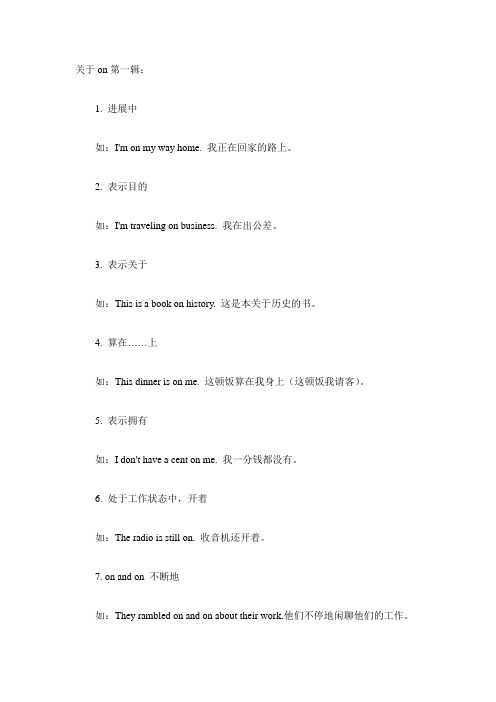
关于on第一辑:1. 进展中如:I'm on my way home. 我正在回家的路上。
2. 表示目的如:I'm traveling on business. 我在出公差。
3. 表示关于如:This is a book on history. 这是本关于历史的书。
4. 算在……上如:This dinner is on me. 这顿饭算在我身上(这顿饭我请客)。
5. 表示拥有如:I don't have a cent on me. 我一分钱都没有。
6. 处于工作状态中,开着如:The radio is still on. 收音机还开着。
7. on and on 不断地如:They rambled on and on about their work.他们不停地闲聊他们的工作。
8. on to 知道……的意图,盯上如:You'll never lie to me again. I'm on tou.你再也无法骗我了,我已经知道你的底细了。
9. on a diet 节食减肥10. on one's own 独自地,独立地如:I can't help you this time. You're on yourown.我这次帮不了你了,你自求多福吧。
11. on purpose 故意地如:I think that she spilled her drink onpurpose.我觉得她是故意弄洒自己的酒的。
12. on second thought 重新考虑之后,进而考虑了一下如:On second thought I don't think I'll go to a movietomorrow.重新考虑了一下我觉得我明天不会去看电影的。
13. on sale 降价出售,大甩卖如:This TV is on sale. 这台电视降价出售。

way是什么意思,by/in the way用法有哪些way是什么意思n.方法; 道路; 方向; 某方面;adv.远远地,大大地;[例句]Freezing isn't a bad way of preserving food冷冻不失为一种保存食物的好方法。
[其他]复数:waysby/in the way用法有哪些by the way/in the way/on the way的用法区别1. by the way常用做状语,意为“顺便问一下,顺便说一下”。
例如:By the way, have you any idea where the post office is?顺便问一下,你知道邮局在哪儿吗?We shall expect you; by the way, dinner will be at eight.我们等着你;顺便告诉你,晚饭在8点钟开。
When I was a boy, I used to play by the way.小时候,我常在路旁玩。
2. in the way 意为“在道上”,有挡道、妨碍的意味,例如:Your car is in the way.你的小汽车挡路了。
Fred tried to get to the door, but the table was in the way.弗雷德想到门口去,但是桌子挡住了他的路。
The box stands in my way.这箱子挡了我的路。
Thinking she was in the way, Aunt Liu got up to leave.刘大婶认为她妨碍了别人,就站起来走开了。
I was not in the way at first and knew nothing of it.起先我并不在场,一点也不了解此事。
3. on the (one's) way 主要有两种意思和用法;1)表示“在途中”,若表示在去某地的途中,其后要用介词to接地点名词表示目的地,若目的地是副词,则不用to;2)表示“在进行中”,常用作动词be的表语,后接介词to+动名词或动作名词。

on way 用法全文共四篇示例,供读者参考第一篇示例:On way是一个常用的短语,其用法广泛且灵活。
在英语中,on way通常表示“在路上”、“在途中”或“正在进行中”。
这个短语可以用来描述一个人、物品或者进程正在前往某个地方或者执行某项任务。
在日常生活中,我们经常可以听到这个短语的使用。
当我们询问朋友的到达时间时,他可以回答说“I’m on my way”表示他正处于前往目的地的路上。
或者当我们正在准备去参加一个活动时,我们可以跟别人说“We are on our way”表示我们已经准备好并且即将出发。
除了表示物品或者人在路上的意思,on way也可以用来指一个过程、行为或者计划正在进行中。
当一个项目进展顺利时,我们可以说“The project is on its way to success”表示项目正在朝着成功的方向发展。
又或者当我们正在准备一份报告时,我们可以说“I’m on my way to finishing the report”表示我们正在进行撰写工作。
on way是一个非常常见且灵活的短语,能够用在各种不同的场合和语境中。
无论是描述人在路上的状态,或者表示一个进程正在进行中,亦或者表示一种趋势或者状态,on way都能很好地表达出来。
在平时的交流中,我们可以灵活运用这个短语,使我们的语言更加生动、地道。
【本篇文章共752字】In the way是另一个常用的短语,有时会与on way混淆。
不过,它的意思和用法都有所不同。
In the way通常表示“在某个地方的道路上”、“挡道”或者“妨碍”的意思。
这个短语通常用来指出某人或某物挡住了前进的路,使得别人无法通过或者前进。
当我们想要走进一扇门的时候,门口挡着一个箱子就可以说“The box is in the way”表示箱子正在挡着去门口的路。
在商业场合中,in the way也经常被使用。
当一个公司的管理层对员工的工作方式进行干涉时,员工可以抱怨说“The new policies are in the way of our p roductivity”表示新的政策妨碍了他们的工作效率。

介词at, in, on,by 表示地方、地点、位置的用法辨析一、小处at , at 把地方、地点、位置当作一个“点”:1. The begger is sitting at the corner. 那乞丐坐在角落里。
2。
Jane is waiting for you at the bus stop. Jane在巴士站等你.at the market, 在市场at the station在车站在(post office 邮局)at the bookshop在书店( hotel宾馆, grocer' s 食品店,杂货店) ,at t Mr. Brown's在布朗家(my uncle's )at Cambridge在剑桥at Peking University 在北京大学3. at home 在家4. Who’s standing there at the door?谁站在门口?/at the window5。
at the top of the page 在一页的上面at the bottom(front ,back ) of6。
The shop is at the end of the road. 那商店就在路的尾端。
7。
at the entrance 在进口处8. at the crossroads 在十字路口9. When will you arrive at the office?你什么时候会到公司呢?10. I’m in France, at Paris。
我住在法国巴黎.(相对法国来讲,巴黎只是一个“点”)11。
There is a small hut at the foot of the hill。
山脚下有一座小屋子。
12。
My aunt lives at 55 Boretz Road in Durham.我的姑妈住在Durham,Boretz 路门牌55号。
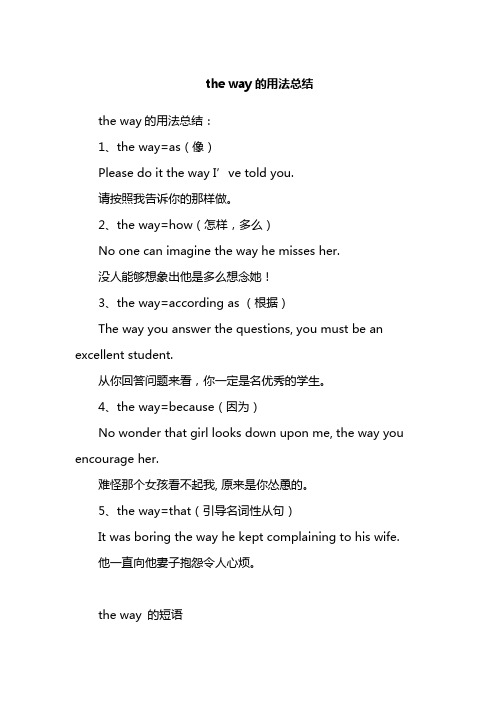
the way的用法总结the way的用法总结:1、the way=as(像)Please do it the way I’ve told you.请按照我告诉你的那样做。
2、the way=how(怎样,多么)No one can imagine the way he misses her.没人能够想象出他是多么想念她!3、the way=according as (根据)The way you answer the questions, you must be an excellent student.从你回答问题来看,你一定是名优秀的学生。
4、the way=because(因为)No wonder that girl looks down upon me, the way you encourage her.难怪那个女孩看不起我, 原来是你怂恿的。
5、the way=that(引导名词性从句)It was boring the way he kept complaining to his wife.他一直向他妻子抱怨令人心烦。
the way 的短语1、in the way 用这种/那种方法/方式;在这那方面做句子的状语。
如:I solve this problem in the way.我用这种方法解决了这个问题。
2、by the way 顺便提/说/问一下单独做成分,用逗号和句子其他部分隔开。
如:By the way,how old are you?顺便问一下,你多大了?3、on the way 在路上/即将到来在句子做地点状语/表语。
如:I lost my purse on the way to school.在来学校的路上,我把钱包丢了。
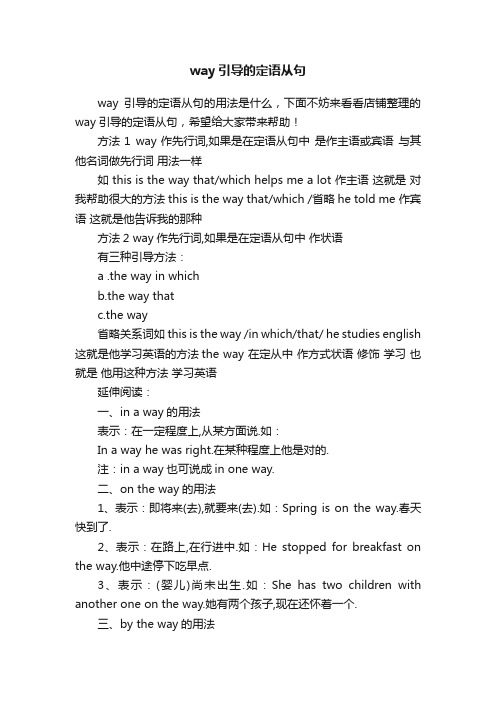
way引导的定语从句way引导的定语从句的用法是什么,下面不妨来看看店铺整理的way引导的定语从句,希望给大家带来帮助!方法1 way作先行词,如果是在定语从句中是作主语或宾语与其他名词做先行词用法一样如 this is the way that/which helps me a lot 作主语这就是对我帮助很大的方法 this is the way that/which /省略he told me 作宾语这就是他告诉我的那种方法2 way作先行词,如果是在定语从句中作状语有三种引导方法:a .the way in whichb.the way thatc.the way省略关系词如 this is the way /in which/that/ he studies english 这就是他学习英语的方法the way 在定从中作方式状语修饰学习也就是他用这种方法学习英语延伸阅读:一、in a way的用法表示:在一定程度上,从某方面说.如:In a way he was right.在某种程度上他是对的.注:in a way也可说成in one way.二、on the way的用法1、表示:即将来(去),就要来(去).如:Spring is on the way.春天快到了.2、表示:在路上,在行进中.如:He stopped for breakfast on the way.他中途停下吃早点.3、表示:(婴儿)尚未出生.如:She has two children with another one on the way.她有两个孩子,现在还怀着一个.三、by the way的用法1、表示:在途中的.路旁.如:They stopped for a picnic by the way.他们途中停在路边野餐.2、表示:顺便说,顺便问.如:By the way,do you know where Mary lives?顺便问一下,你知道玛丽住在哪里吗?四、in the way的用法表示:挡路,碍事.如:I'm afraid your car is in the way,恐怕你的汽车挡道了.注:in the way有时也可说成in sb's way.如:You are in my way.你挡着我的路了.【way引导的定语从句】。

介词的用法与练习I.介词的种类1.?简单介词,常用的有at,?in,?on,?about,?across,?before,?beside,?for?,?to,?without,to,by,with,of,over,behind,up,after,against等。
2.?复合介词,如onto,?along?with,?because?of,?in?front?of,?instead?of等。
3.介词和其他词类的习惯搭配关系(1)?和动词的搭配,如agree?with,?ask?for,?belong?to,?keep?away?from,?care?about等。
(2)?和形容词的搭配,如afraid?of,?angry?with,?different?from,?good?at(3)?和名词的搭配,如answer?to?,?key?to,?reason?for,??avisit?to等.***介词后常跟人称代词的宾格和动词的ing形式。
,,in?this?way?用这样的方法,inthatway,inotherway,intheseways6.across,through,和past“通过,经过”across从表面经过,如,road,bridge,riverthrough从内部空间经过,如:city,woods,forests,window,gatepast,从旁边经过.EX:Fillintheblankswith past,across or through.1.Wehavetowalk____________thegatetogointothefactory.2.Whenwewent__________thecinema,wesawatrafficaccident.3.Lookout___________thewindow,please.4.Don’twalk__________theice.It’sdangerous.5.Suddenly,ayoungmanran__________me.6.Ifyouwalk_________thesquare,youwillseetheSunflowerHotel.7.Therivergoes______________thecity.8.Theoldmancanswim__________thestream.9.Iwalked_________himwithoutsayinghello.10.Thearmymoved_____________theforestsquietly.7.for,since,A.since仅说明什么时候开始,,后常跟一个具体的过去的时间.B.for表示某动作或情况持续多久,后常跟一段时间。
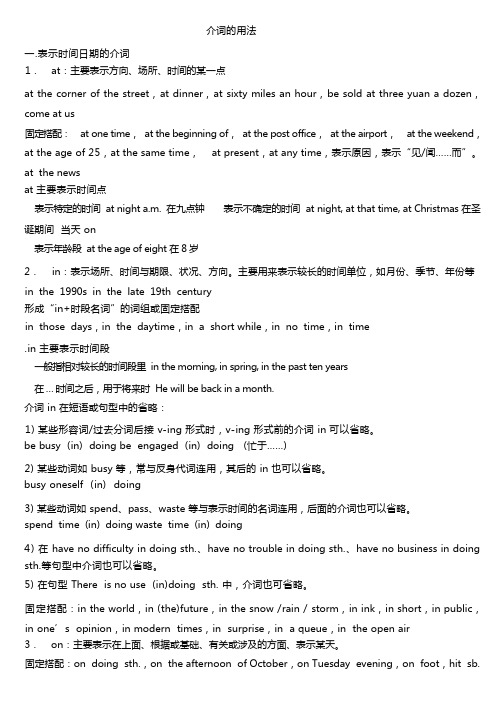
介词的用法一.表示时间日期的介词1. at:主要表示方向、场所、时间的某一点at the corner of the street,at dinner,at sixty miles an hour,be sold at three yuan a dozen,come at us固定搭配: at one time, at the beginning of, at the post office, at the airport, at the weekend,at the age of 25,at the same time, at present,at any time,表示原因,表示“见/闻……而”。
at the newsat 主要表示时间点表示特定的时间 at night a.m. 在九点钟表示不确定的时间 at night, at that time, at Christmas 在圣诞期间当天 on表示年龄段 at the age of eight 在 8 岁2. in:表示场所、时间与期限、状况、方向。
主要用来表示较长的时间单位,如月份、季节、年份等in the 1990s in the late 19th century形成“in+时段名词”的词组或固定搭配in those days,in the daytime,in a short while,in no time,in time.in 主要表示时间段一般指相对较长的时间段里 in the morning, in spring, in the past ten years在…时间之后,用于将来时 He will be back in a month.介词 in 在短语或句型中的省略:1) 某些形容词/过去分词后接 v-ing 形式时,v-ing 形式前的介词 in 可以省略。
be busy (in) doing be engaged (in) doing (忙于……)2) 某些动词如 busy 等,常与反身代词连用,其后的 in 也可以省略。
1、Sorry,you are in the way.对不起,你挡路了。
这里的in the way是挡路的意思,但也有用这种方法的意思:I cooked this in the way you showed me。
我烤了这个用你告诉我的方式
2、in this way以这种方式
In this way,he has collected a great many stamps。
用这种方法他收集了大量的邮票。
3、on the way 在去某地的路上
On the way to the station,I bought some chocolate。
在去车站的路上我买了些巧克力。
4、by the way顺便说一声,可以让一个句子很严肃的问题变得随意
By the way,have you seen Harry recently?顺便说一句,你最近见过哈里吗?
5、in a way从某种意义上说
In a way,it is an important book。
在某种意义上,这是一本重要的书。
答:in the way 等必须看在句子里它们的意思,以下举几个例子供参考。
⊙in the way(挡路;妨碍):Her social life got in the way of her studies(她的社会活动妨碍了她的学习。
)
⊙on the way(在路上):Let’s wait a few moments. He’s on the way.(咱们等一会儿,他正在路上。
[快到了])
⊙By the way 是个语气词,即“附带说一句”之意。
如:By the way,has everybody arrived?(附带问一句,大家是否都到了?)
⊙In a way,是“某个方面”,“在某种意义上”。
如In a way,he was right.(在某个意义上说,他是对的。
)
on one's way back在某人回来的路上
on one's way在某人去...的路上。